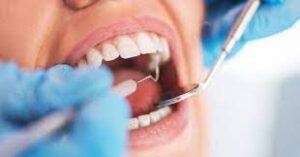Most Canadians understand the importance of preventative healthcare; we eat a nutritious diet, exercise, and see the doctor regularly. When it comes to dental care, however, many people delay routine check-ups; in Ontario, more than 25% of people don’t visit the dentist every year, and 19% say they only see the dentist for emergencies.
Usually, the avoidance of routine dental care stems from anxiety, either about the cost of dental treatment or discomfort. (Approximately 36% of adults live with dental fear, while 12% struggle with a severe phobia of seeing the dentist.) In some cases, however, people delay seeing the dentist because they don’t realize how crucial regular dental visits are to maintaining their oral health – and their overall health.
Table of Contents
Why Are Dental Check-Ups Important?
Dental check-ups involve a lot more than teeth cleaning; they’re an opportunity for your dentist to identify tooth decay, gum disease, and other oral health conditions in their early stages. By catching problems before they develop, twice-annual dental visits often prevent the need for expensive, invasive treatments later on (when combined with regular brushing and flossing). As such, seeing your dentist regularly is one of the best ways to reduce oral care costs. Routine dental cleanings can also help people with dental phobia become more confident about visiting the dentist by approaching dental care in small, manageable steps.
Not only do dental check-ups help you maintain healthy teeth and gums, but they’re also integral to protecting your overall health. Bacteria from infected teeth and gums have been shown to enter the bloodstream, where they can contribute to heart disease, stroke, diabetes, and other health conditions. Being proactive about your oral health is therefore vital to your overall quality of life.
Read on to learn more about how dental check-ups can help you stay healthy and preserve the beauty of your smile:
4 Benefits of Regular Dental Check-Ups
1. Dental cleanings prevent tooth decay and cavities.

Even if you practice excellent oral hygiene at home, you need regular dental check-ups to help keep your gums healthy and prevent plaque, tartar, cavities, and tooth decay. Toothbrushes can’t reach below the gum line, and in many cases, teeth have natural pits and fissures that are hard to fully clean at home. Without professional dental cleanings, plaque and bacteria build up in these hard-to-reach places, eventually forming tartar (also known as dental calculus). Tartar is a hard, porous deposit consisting of minerals and dead bacteria. In addition to being unsightly and causing bad breath, it provides an ideal surface for plaque to form. Over time, plaque damages the teeth and surrounding tissues, leading to cavities and gum disease.
During a dental exam, your dentist will perform a professional cleaning using specialized tools that reach below the gum line to remove plaque and tartar buildup. This process ensures that tooth decay doesn’t get a chance to take hold, preventing cavities and other painful dental complications in the future (along with brightening your smile and freshening your breath).
You will also receive dental X-rays and a thorough visual examination to detect developing cavities and other problems before they harm your teeth. If your dentist sees any signs that you might be at risk of developing cavities, he or she will apply a fluoride treatment to reverse potential tooth decay. If your teeth have pits and fissures that could predispose them to cavity formation, your dentist may suggest using dental sealants to fill in these spaces, sealing out plaque and bacteria. Fluoride treatments and dental sealants are affordable, noninvasive, and painless, making them a great way to manage early oral health concerns.
Before you leave your dentist’s office, you’ll also receive comprehensive home care instructions and advice on choosing the best oral care products. Your dentist can help you learn how to brush and floss correctly and discuss which foods, beverages, and habits (such as smoking) to avoid to prevent tooth decay and gum disease.
2. You’ll be screened for oral cancer.
Left undetected and untreated, oral cancers can be disfiguring and even deadly. As such, one of the most important reasons to see your dentist regularly is for oral cancer screening. When oral cancer is found early by a dentist, it has a much more favourable treatment outcome.
Dentists are trained to recognize the earliest signs of oral cancer, making them a crucial first line of defense. Using noninvasive screening tools, such as a VELscope device, they can identify oral cancer before it becomes visible to the naked eye or causes symptoms. The VELscope uses Fluorescence Visualization (FV), a type of blue light, to reveal hidden lesions, areas of dead tissue, or abnormally high blood concentrations, issues that indicate a high risk of cancer. This process is painless, quick – taking a few minutes, and in many cases, identifies oral cancers before they can cause significant damage. By going for regular check-ups, you can take control of your well-being and prevent the advancement of potentially serious oral cancers.
3. Regular dental check-ups help prevent gum disease.
Like dental cavities, gingivitis (gum disease) is a common consequence of allowing plaque and tartar to accumulate below the gum line. Without annual dental cleanings, the bacteria in tartar build up and secrete toxins that attack the gum tissue, ligaments and bones that hold teeth in place. As these tissues erode, the gums recede – causing painful tooth sensitivity and bleeding – and the teeth loosen, a process that can eventually result in tooth loss. Gingivitis also frequently leads to periodontitis, a serious infection of the gums that damages soft tissue around the teeth, causing pain, inflammation, and chronic bad breath. Periodontitis also significantly increases the risk of developing dangerous dental abscesses.
Even if you don’t display obvious signs of gum disease, you should have your mouth examined regularly by a dentist. The earliest stages of gum disease usually have no symptoms, so by the time you notice redness and inflammation, your teeth and gums may already have sustained lasting damage. If caught early, on the other hand, gingivitis can often be reversed with simple changes in how you care for your teeth, such as brushing and flossing more often or avoiding certain foods. More advanced cases of gum disease can usually be treated with frequent dental cleanings or specialized deep cleaning procedures, such as root planing.
To detect gum disease, your dentist will check for subtle signs of swelling and receding gums. Your dentist will also examine the pockets between your teeth and gums for gaps that could indicate the presence of gum disease. If any issues are discovered, you’ll be provided with a comprehensive treatment plan to manage and reverse gum disease, ultimately protecting you from tooth loss and infections.
4. Dental check-ups can reveal hidden problems affecting your teeth, gums, and jaw.
In addition to detecting early tooth decay, dental X-rays can shed light on a wide range of problems under the gums which are not visible to the naked eye. Dental X-rays can reveal bone loss in the jaw, for example, which may arise from bruxism (teeth grinding), dental misalignment, or TMJ disorders, and which frequently causes these problems to get worse over time. X-rays can also find hidden infections, impacted or unerupted teeth, cysts, and tumours. Treating these problems while they’re in their early stages can prevent significant discomfort and long-term complications, helping you maintain a healthy smile for life.
What to Expect at Your Dental Check-up?

If you experience dental anxiety, knowing what will happen during a dental check-up can allay your fears and help you prepare for your appointment. The good news is that dental check-ups are easy, straightforward, and don’t involve any invasive procedures; to examine your teeth, your dentist will use X-rays, visual inspection, and tiny probes, meaning you’ll barely feel anything. In most cases, dental exams are completed in under an hour, allowing patients to quickly resume their normal routine.
When you first arrive for your check-up, your dentist will talk to you about your oral health history. He or she will ask about any changes you’ve noticed since your last appointment and address any concerns you have regarding your oral health. Then your dentist will examine and clean your teeth and gums using the following techniques:
Dental X-Rays
Not every dental check-up involves X-rays, but your dentist may recommend having an X-ray if you haven’t been to the dentist in a while or you’re suspected of having tooth decay or gum disease. You may also request an X-ray if you would prefer to have your dentist take a deeper look at your teeth and gums.
Dental X-rays are useful because they provide a comprehensive picture of what’s happening above and below the gums. They can detect cavities in places that are impossible to see with the naked eye (e.g., between the teeth) and reveal issues affecting the roots of the teeth, the gums, and the jawbone.
Professional Dental Cleaning
Though daily brushing and flossing greatly reduce plaque and tartar formation, even those with excellent oral hygiene habits experience some degree of tartar build-up below the gum line and in hard-to-reach areas, such as around the back molars. For this reason, dental check-ups almost always involve a thorough dental cleaning.
Dental cleanings are performed by highly-trained dental hygienists and typically consist of scaling and polishing. During scaling, tartar is gently loosened and removed from the teeth with specialized instruments that can reach below the gum line. Polishing is performed after scaling to remove plaque, stains, and debris, which whitens and brightens the teeth.
Fluoride Treatment
The final stage of a dental exam usually consists of a fluoride treatment. Fluoride is a naturally-occurring mineral that helps prevent cavities and tooth decay by making tooth enamel more resistant to acid erosion from sugar consumption, plaque, and bacteria. A single professional fluoride treatment from your dentist will help safeguard your teeth against decay for three to six months.
To apply fluoride to your teeth, your dentist will use a highly concentrated mouth rinse, foam applied via dental trays, or varnish brushed onto the teeth. You will be asked to allow the fluoride to remain on your teeth for several minutes, then you will be instructed to avoid eating or drinking anything for 30 minutes.
Ready to Book Your Next Dental Check-up in Mississauga? Give Us a Call!
Finding the right dentist can be challenging, especially if you experience dental anxiety, but it’s imperative for maintaining optimal dental health. That’s why we make booking an appointment simple by providing compassionate, understanding dental care for the whole family from our convenient location in Mississauga. Dr. Oscar Dalmao can address your oral health concerns with gentle, affordable care, and each of our dental exams includes comprehensive education designed to help patients prevent tooth decay, cavities, and gum disease at home. With this patient-centred approach, we strive to make you and your family more confident about your oral health.
If you’re looking for an experienced dentist and oral surgeon in the Mississauga area, contact Dr. Oscar Dalmao today. No matter how long it’s been since your last dental appointment, you’ll receive a friendly welcome and expert care from our dental team at our Mississauga dental clinic.
Check out the full dental services at Dr Dalmao Dental Implant Center in Mississauga & schedule your appointment here:


